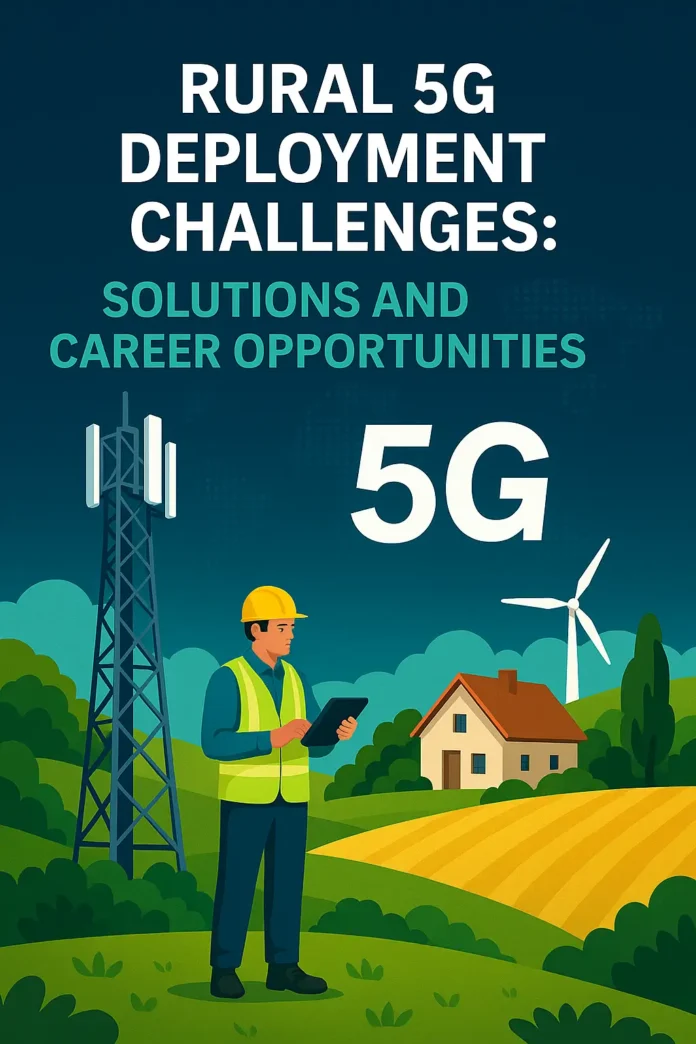While urban areas enjoy widespread 5G coverage, rural communities face unique challenges in accessing next-generation wireless technology. The deployment of 5G networks in rural areas presents both significant obstacles and tremendous opportunities for telecommunications professionals. Understanding these challenges and their solutions is crucial for anyone pursuing rural 5G training, telecom infrastructure courses, or field engineer certification in today’s evolving telecommunications landscape.
The Rural 5G Challenge: Why Deployment is Complex
Rural 5G deployment differs dramatically from urban installations, requiring specialized knowledge and skills that professionals can develop through targeted telecommunications training programs and 5G certification courses.
Geographic and Infrastructure Barriers
Rural areas present unique geographical challenges that urban deployments rarely encounter. Vast distances between population centers mean that traditional cell tower spacing strategies don’t work effectively. Mountains, valleys, and dense forests create natural barriers that interfere with 5G signal propagation, particularly for higher frequency bands.
The existing telecommunications infrastructure in rural areas is often outdated or insufficient to support 5G technology. Many rural locations still rely on older copper-based networks or limited fiber optic connections, making the transition to 5G more complex and expensive. Professionals interested in addressing these challenges can benefit from specialized telecom infrastructure courses that cover rural deployment strategies.
Economic Viability Concerns
The economic case for rural 5G deployment is challenging. Lower population density means fewer potential customers to support the significant infrastructure investment required. Telecommunications companies must carefully balance the cost of deployment with projected revenue, often making rural areas a lower priority for 5G rollouts.
However, government initiatives and subsidies are creating new opportunities for professionals trained in rural telecommunications. Those with expertise in 5G project management and rural deployment training are increasingly valuable in this evolving market.
Technical Solutions for Rural 5G Implementation
Overcoming rural 5G challenges requires innovative technical approaches and specialized expertise that professionals can develop through comprehensive 5G training and field technician certification programs.
Low-Band 5G Strategies
Rural deployments often prioritize low-band 5G frequencies (600-700 MHz) that provide better coverage over long distances. While these frequencies don’t deliver the ultra-high speeds associated with millimeter wave 5G, they offer the coverage radius necessary for sparse rural populations.
Understanding spectrum allocation and propagation characteristics is essential for rural deployment success. Professionals pursuing RF engineering certification or spectrum management courses gain the technical knowledge needed to optimize rural 5G networks effectively.
Dynamic Spectrum Sharing (DSS)
Dynamic Spectrum Sharing allows 4G and 5G signals to coexist on the same frequency bands, maximizing efficiency of existing spectrum allocations. This technology is particularly valuable in rural areas where spectrum is limited and must be used efficiently.
DSS implementation requires specialized knowledge that professionals can acquire through advanced LTE training and 5G certification programs that cover both legacy and next-generation technologies.
Small Cell and Distributed Antenna Systems
Rural areas benefit from strategic placement of small cells and distributed antenna systems to extend coverage without the expense of full macro cell towers. These solutions require careful planning and installation expertise.
Professionals trained in small cell deployment through specialized telecom courses and field engineer certification programs are essential for successful rural 5G implementations.
Innovative Deployment Models
Rural 5G success often depends on creative deployment strategies that differ from traditional urban approaches. Understanding these models is crucial for professionals seeking careers in rural telecommunications.
Public-Private Partnerships
Many successful rural 5G projects involve partnerships between telecommunications companies, government agencies, and local organizations. These partnerships help share costs and risks while ensuring community needs are met.
Professionals with training in telecommunications project management and public sector telecom courses are well-positioned to participate in these collaborative initiatives.
Neutral Host Networks
Neutral host networks allow multiple carriers to share infrastructure costs, making rural deployment more economically viable. This approach requires specialized knowledge of multi-carrier coordination and network management.
Those interested in this field can benefit from network sharing certification and infrastructure management training that covers neutral host implementations.
Satellite Integration
Low Earth Orbit (LEO) satellites are increasingly being integrated with terrestrial 5G networks to provide backhaul connectivity in remote areas. This hybrid approach combines satellite technology with ground-based 5G infrastructure.
Understanding satellite-terrestrial integration requires specialized training available through advanced 5G courses and satellite communications certification programs.
Career Opportunities in Rural 5G
The unique challenges of rural 5G deployment create specialized career opportunities for professionals with the right training and certification. The field offers diverse paths for those committed to bridging the digital divide.
Rural Network Planning Specialist
Rural network planning specialists design 5G networks specifically for sparse population areas, considering unique geographic and economic factors. These professionals typically earn $75,000-$120,000 annually and require specialized training in rural deployment strategies.
Essential skills include:
- RF propagation modeling for rural environments
- Economic analysis of rural deployment projects
- Geographic information systems (GIS) for network planning
- Regulatory compliance for rural telecommunications
Professionals can develop these skills through comprehensive telecom training programs and rural deployment certification courses.
Field Engineer for Rural Deployments
Field engineers specializing in rural 5G installations handle the physical deployment and maintenance of network equipment in challenging environments. These roles often offer salaries ranging from $60,000-$95,000 with excellent job security.
Key responsibilities include:
- Installing and configuring 5G equipment in remote locations
- Troubleshooting connectivity issues in challenging environments
- Maintaining backup power systems and environmental controls
- Coordinating with local communities and landowners
Success in this field requires practical field technician certification and hands-on 5G installation training.
Rural Connectivity Consultant
Consultants help communities, businesses, and government agencies develop strategies for improving rural connectivity. This role combines technical expertise with business development skills.
Typical earnings range from $80,000-$150,000 annually, with opportunities for independent consulting at higher rates. Success requires:
- Deep understanding of rural telecommunications challenges
- Knowledge of funding sources and grant opportunities
- Ability to communicate technical concepts to non-technical stakeholders
- Project management skills for complex deployments
Professionals can prepare for consulting roles through comprehensive telecommunications training programs and business development courses focused on rural markets.
Government Initiatives and Funding Opportunities
Government programs are creating new career paths and business opportunities in rural 5G deployment. Understanding these initiatives is crucial for professionals seeking to enter this field.
Federal Rural Connectivity Programs
Programs like the Rural Digital Opportunity Fund (RDOF) and the Broadband Equity, Access, and Deployment (BEAD) program provide billions in funding for rural connectivity projects. These initiatives create demand for qualified professionals with rural deployment expertise.
Professionals with grant writing certification and regulatory compliance training are particularly valuable in this environment.
State and Local Initiatives
Many states have launched their own rural connectivity programs, creating additional opportunities for trained professionals. These programs often prioritize local hiring and training, making them excellent entry points for new professionals.
Understanding state-specific requirements and opportunities is part of comprehensive regional telecom training programs.
Skills Development for Rural 5G Careers
Success in rural 5G deployment requires a unique combination of technical and soft skills that professionals can develop through targeted training and certification programs.
Technical Skills
Essential technical competencies include:
- RF Engineering: Understanding propagation in rural environments
- Network Planning: Designing cost-effective rural networks
- Project Management: Coordinating complex rural deployments
- Regulatory Knowledge: Navigating rural telecommunications regulations
- Environmental Assessment: Understanding rural deployment impacts
These skills are available through specialized 5G certification programs and rural telecom courses designed for working professionals.
Soft Skills
Rural deployment success also requires strong interpersonal skills:
- Community engagement and stakeholder management
- Cultural sensitivity for diverse rural communities
- Problem-solving abilities for unique challenges
- Adaptability for changing project requirements
- Communication skills for technical and non-technical audiences
Professional development programs focusing on rural telecommunications often include training in these essential soft skills.
Training and Certification Pathways
The specialized nature of rural 5G deployment creates unique training and certification requirements. Professionals should consider multiple educational pathways to build comprehensive expertise.
Foundational Education
Start with comprehensive 5G training that covers basic principles, then advance to specialized rural deployment courses that address unique challenges and solutions.
Recommended progression:
- Basic telecommunications training covering industry fundamentals
- Intermediate 5G certification focusing on technology and implementation
- Advanced rural deployment training covering specialized strategies
- Professional project management certification for deployment leadership
Continuing Education
The rapidly evolving nature of rural 5G technology requires ongoing professional development. Stay current through:
- Regular online telecom training updates
- Industry conferences and workshops
- Vendor-specific equipment training
- Regulatory compliance updates
- Emerging technology seminars
Future Outlook for Rural 5G
The future of rural 5G deployment looks increasingly promising, creating sustained career opportunities for trained professionals. Several trends are driving growth in this sector.
Increasing Government Support
Government recognition of rural connectivity as essential infrastructure is driving increased funding and support for deployment projects. This sustained investment creates long-term career stability for professionals in the field.
Technological Advances
Advances in equipment efficiency, satellite integration, and deployment techniques are making rural 5G more economically viable. These improvements create new opportunities for professionals trained in the latest technologies.
Growing Demand for Rural Connectivity
Remote work trends, telemedicine adoption, and digital agriculture are increasing demand for reliable rural connectivity. This growing market creates expanding opportunities for qualified professionals.
Getting Started in Rural 5G
For professionals interested in entering the rural 5G field, success begins with the right training and preparation. Consider these steps to launch your career:
Assess Your Current Skills
Evaluate your existing telecommunications knowledge and identify areas for development. Most successful rural 5G professionals combine technical expertise with project management and communication skills.
Choose Appropriate Training
Select telecommunications training programs that specifically address rural deployment challenges. Look for courses that combine theoretical knowledge with practical, hands-on experience.
Gain Practical Experience
Seek opportunities to work on rural projects, even in supporting roles. Practical experience with rural challenges is invaluable for career advancement.
Build Professional Networks
Connect with other professionals working in rural telecommunications. Industry associations, conferences, and online communities provide valuable networking opportunities.
Conclusion
Rural 5G deployment represents one of the most challenging yet rewarding areas in modern telecommunications. The unique technical, economic, and social challenges create specialized career opportunities for professionals with the right training and expertise.
Success in this field requires a combination of technical knowledge, project management skills, and community engagement abilities. The investment in specialized rural 5G training, field engineer certification, and telecommunications courses pays dividends through access to meaningful, well-compensated careers that directly impact community development and digital equity.
As government support increases and technology advances make rural deployment more viable, the opportunities for trained professionals will continue to expand. Those who invest in developing rural 5G expertise today are positioning themselves at the forefront of an essential and growing field.
Whether you’re starting your telecommunications career or looking to specialize in a growing niche, rural 5G deployment offers the opportunity to combine technical innovation with meaningful community impact. The digital divide will only be bridged by skilled professionals committed to bringing next-generation connectivity to every community.
Benefit from Massive discount on our 5G Training with 5WorldPro.com
Start your 5G journey and obtain 5G certification
contact us: contact@5GWorldPro.com


